International Exchange
International Exchange
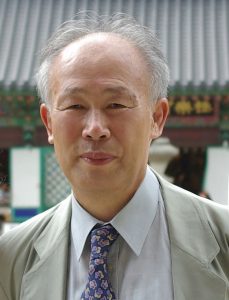
Oh Sae-young
About the Anthology of Oh Sae-young A thousand year sleep
SUH,JaeGon
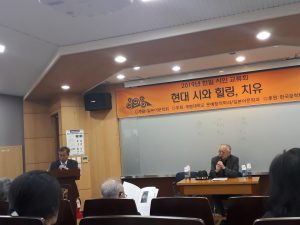
SUH,JaeGon and Kiwao Nomura
It was the 50th anniversary for Japan and South Korea since the diplomatic relations were rebuild. Since then, Toru Kitagawa and I planned out the Japanese and Southeong Korean exchange. We held the exchange in Daegu, Soul in 2015, Shimonoseki in 2016, S nam in 2017, Tokyo in 2018, and Daegu again in 2019. From Japan side, Toru Kitagawa, Kenji Fukuma, Kiwao Nomura, Gen-ei Watanabe, Naha Kanie, Kei Okamoto, and Misei Akegata participated. We decided the main theme of the exchange, wrote poems by ourselves, chose poems from their countries, and made a speech of the poetic world.
In April of 2018, I gave a lecture about Sakutaro Hagiwara in Tokyo University of Foreign Studies as a special guest professor. Misei Akegata won 9th Ayukawa Nobuo Prize in the same year. When I joined the ceremony, Kitagawa introduced me Nomura as a participant of the exchange. In July, Nomura gave a speech about “The Change of Culture and Survival of Poetry,” which was held in Tokyo University. The following year of 2019, the main theme for the exchange was “Contemporary Poetry and Healing.” Nomura mentioned, “The poetry heals people by not healing.” Oh also pointed out the “poetic healing of han.” And the last year, we were planning the exchange and to publish Oh’s book of poems translating to Japnese, but we canceled the exchange and postponed the publishing due to the pandemic of Covid-19.
Oh is one of the most famous contemporary poet in South Korea, who is also a member of The National Academy of Arts, The Republic of Korea. He appeared in 1965, and has published over thirty books of poems. Although he retired from Seoul National University, he is still active as a critic.
Oh represents the history of contemporary Korean Poetry, acknowledged by the readers of every age. In 1945, South Korea became independent from Japan. After it experienced modernization, industrialization, and democratization in the country, South Korea is now the member of developed country. He wrote the great change of the society of South Korea by using his unique sense.
In his earlier career, he depicted the corruption of Korean Society due to the industrialization. He denied and dissected the traditional lyricism in his works. In his middle career, based on eastern philosophy of Buddhism and the golden mean, the poet mainly wrote metaphysical poetry. He overlapped the existential suffering of modern people to the absurd of the dictatorship. After that, he open up the new poetic world which is called “Nature Lyricism.” The poet expressed his philosophy of affection to the society and human being. He believed the danger of modern civilized society will be overcome by harmonizing nature and human being.
Oh’s fifty years of long poetic career was to create the image, explore the existence, pursue the oriental spiritual world, harmonize nature, and make the silent effort to nirvana. His voyage of exploring the essence of poetry and life has not ended yet.
The anthology titled A Thousand Year Sleep was published in 2012. The translated version will be 81 pieces in total, over 200 pages, including the works after the publication of 2012. I would like to introduce the message from Oh to the member of Japan Poets Association:
The poetic phrases frequently appear in my collections are water, fire, wind, or air, earth. All the words are translated into other words in the poems. Water, fire, air and earth are four major elements as Empedocles and Aristoteles mentioned. I have scooped the various phenomenon of life by using a net of language. In that process, what I have most put emphasis on was the sense of balance. In other words, it is the imagination which connects the various conflicting values by oriental wisdom.
Gim Sijong, Korean in Japan, wrote in his book of poems Pray, “The poetry is the expression of how people see and feel. We, the poets, need to answer what we see as the basic. The poets should mix that idea of basic with the idea of the world and the art to deepen the quality of the poet.”
I hope the various paradigms in this anthology will reach to the heart of the poets in Japan, and make the vortex of communion and resonance.
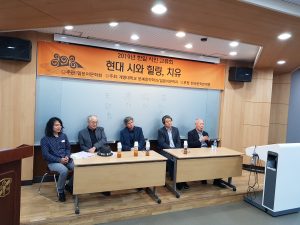
International exchange with Korea
International exchange with Kazakhstan
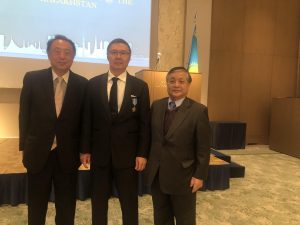
The chairman KUROIWA and director NIINOBE as the delegates of Japan Poets Association attended the National Day of the Republic of Kazakhstan (the 28th Independence Day) on December 12,2019. The picture shows the ambassador to Japan.
Recently Kazakhstan is making remarkable development as resources power and has achieved good economic relations with Japan. Furthermore, cultural exchanges between two countries are desired now.
As a side note, it is known that the famous postwar poet Yoshiro Ishihara was detained as a prisoner of war at Alma-Ata in Kazakhstan.
The Latest International Exchange
Vietnam Poetry Day in Hanoi
The Flower of the Poem in Sky
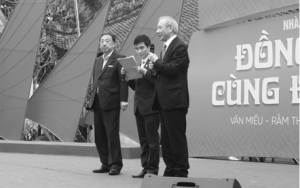
Kohei Ikura, Ken Niinobe, Toshio Suzuki, and Daisuke Goto who is currently living in Ho Chi Minh City were invited to the festival of “Vietnam Poetry Day” in Hanoi for the international exchange continuing from 2017. The festival is launched by Vietnam Writers Association. Huu Thinh, Chairman of Vietnam Writers Association, had invited Ikura, Niinobe, and Suzuki to Hanoi in the summer of 2017 at first, but it actually happened in the spring of 2018 in the end.
[Flamboyant Poetry Festival]
In March 2nd, 2018, the festivals of “Vietnam Poetry Day” were held in all areas of Vietnam. The main festival was held in the square of Well of Heavenly Clarity, Temple of Literature. There were some music and dance performance on a flourish stage, like Quan Ho, Vietnamese folk music and a poetical drama with the flutes and drums. Mr. Thinh and Mr. Ikura earned applause from the audience for giving the speech.
Poetry Reading in this festival is the supreme glory for Vietnamese poets. Many poets wishes to give the performance in the festival. Anh Ngoc, who came to Japan in April of 2017 for the international exchange program, read a long poem. Most of the Vietnamese poets recite the poems.
Mr. Ikura read two poems in bilingual style with Vietnamese poets, “I Found the Sal Tree at Station” and “Summer Solstice.” The audiences loved their reading. In the middle of the festival, we were brought to the other area where the energetic readings were held with the guitar performances. It seemed the young poets were giving the reading performance on this stage. The performers of the skit seemed to be the improvisational poets who love Hat Cheo, the conventional performance in Vietnam.
We were introduced to the audiences by a compere. Mr. Niinobe gave a greeting speech to the Vietnamese poets and audiences. He also read his poems, “You Saw Me” and “To My Holiday,” and I read “The Song of the Splash and Sickle” and “Dripping Blood on Forehead.” All the works were read in Vietnamese by the compere after we read.
Mr. Niinobe was interviewed and recorded by the state-run broadcasting for the news. An old poet who writes haiku praised my reading and gave me a handshake. I was also asked to take a photograph from other poets. I was happy that they understood our poems.
[Releasing Poems to the Wind]
At climax, poems and the poets’ name, which were chosen from all over the country, were hung to balloons, and released to the sky. Some poets wait for this honor for more than ten years. The ritual of “Releasing Poems” was spectacular. Red lanterns had been released before they flew the balloons, but due to the risk of the fire, the lanterns were suspended.
[Releasing Poems to the Wind]
At climax, poems and the poets’ name, which were chosen from all over the country, were hung to balloons, and released to the sky. Some poets wait for this honor for more than ten years. The ritual of “Releasing Poems” was spectacular. Red lanterns had been released before they flew the balloons, but due to the risk of the fire, the lanterns were suspended.
[Consideration on Vietnam]
I was very happy to have meaningful discussion on poetry with Mr. Huu Thinh, Mr. Anh Ngoc, and Ms. Kim Dao. We had three times of opportunity to spend time together during our stay. We talked more than eight hours in total.
“The first Japanese poet who had an international relationship with Vietnam was Abe no Nakamaro.”
“His name in the Tang period was Chao Heng.”
“In 753, on his way home from Chang’an, he was blown to the coast of Vinh by the storm.” “He was a friend of Li Po and Wang Wei.” “He served as the governor of Hanoi through 760 to 766.”
“…” It was the first time to hear that for Mr. Huu Thinh.
I was told in the welcome party that there was a tacit understanding that “the political poems were not appropriate” for the festival.
Unfortunately, according to the research by Reporters Without Boarders, the evaluation of freedom of press in Vietnam is very low.
Identity of Vietnam is fascinating. It is born from peculiar culture in East Asia, a folk belief, Mahayana Buddhism, and the unique history. We came to know by reading the translation of Sakae Kato that the quality of Vietnamese literature is quite impressive. There are some verses mixed in the novels, which is peculiar to Vietnamese. The expression on the war experience and the aftereffect approaches to the reality. It creates complete different world compared to postwar literature of Japan,
[Writers Associations Reaching the Auspicious Age of Sixty]
Last year, Vietnam Writers Association had reached the 60th years since its foundation. They celebrated in April 4th, which is supposed to be the happy day in Vietnam.
The major activity of Vietnam Writers Association is to publish the literary magazine called Literature and works by Vietnamese writers. Literature has been published since the association was established. Being published on the magazine is a good opportunity for young poets to let people know their works. Mr. Ikura’s greeting speech and our poems will be published also.
Even though the government has stopped a subsidy in recent years, some capitalists assists the publication so that new literary magazines are being published. I saw a huge bookshop in Trang Tien street near the hotel we stayed.
Mr. Huu Thinh was born in 1942 and Mr. Anh Ngoc in 1943. I did not ask when Ms. Kim Dao was born. She studied abroad in Russia for seven years. Both Mr. Thinh and Mr. Ngoc are talented in speaking Russian. They even published the book of poems in Russian. Mr. Ngoc’s daughter is now living in London. He told me there are few numbers of young poets whose works are translated into English. Some staffs working for Literature are good at speaking in English. Young poets and writers are active in post-Doi Moi Vietnam.
There are 200,000 Vietnamese living in Japan currently. It is the time for change. Poetry should leap the boundary of language.
[Many Thanks to Vietnam]
Ms. Kim Dao really taken care of us since we arrived to Vietnam. On March 1st, she took us to Ho Chi Minh Mausoleum, Chua Mot Cot (One Pillar Pagoda), and War Remnants Museum. She also took us to the national cemetery where the representative Vietnamese writers and poets sleep. We offered flowers at the cemeteries. On March 3rd, while watching Citadel of the Hồ Dynasty from the car window, we headed to the city of Ninh Binh. After that, we went to Tràng An Scenic Landscape Complex. It was Saturday just after the New Year of Vietnam, so that the boat tour was crowded with people.
We stayed at Hoa Binh Hotel founded in 1926. It locates at the center of the city. The hotel was really calm, which reminded me of the elegance of France. I had good time having a walk around the Hoan Kiem Lake. The flowers were in full bloom.
(written by Toshio Suzuki)
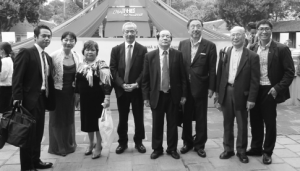

[Note]
Huu Thinh: born in Vinh Phuc province. He is the author of The Sound of Battlefield, From Battlefield to City, When Little Hoa was Born, The Season of Winter, The Deal of Time, and more. He published epic To the Street (Vietnam Writes Association Prize in 1980), Epic of Sea, The Strength of Earth. He also wrote an essay The Reason for Hope and a collection of short fiction and nonfiction. He achieved second Vietnam Writes Association Prize in 1995 for Winter Letter. He also has awarded for the Southeast Asian Writers Award in 1999, Vietnam Literature Awards in 2001, Ho Chi Minh Award in 2012. He currently serves for Chairman of Vietnam Writers Association.
Thinh’s poems are on the Vietnamese textbook. Some musicians set his poems to music. His works are translated into Russian and other nine languages.
Poets in Kazakhstan
November in 2017, five poets came to Japan from the Republic of KazakhstanWe, Akira Aki and Toshio Suzuki, as representatives from Japan Poets Association, visited the embassy of the Republic of Kazakhstan in November 14th. We had a discussion for three hours with the poets from Kazakhstan.
After the greeting, the first secretary of the embassy introduced the poets Kazakhstan to us. The leader was Umitkhan MUNALBAYEVA, a curator of National Library of Kazakhstan, Garifolla YESIM, a poet, writer and congressman, Ulykbek YESDAULET, a poet and songwriter, Ursyn ZHURTBAY, a poet and professor of L. N. Gumilyov Eurasian National University, Onaygul TURZHAN, a poet, critique, and associate professor of L. N. Gumilyov Eurasian National University. I am not sure with the spelling of their names. I apologize if there are any wrong spellings.
We gave some books of poems as gifts, which was Ms. Shindo’s advise, and started the discussion.
Their purpose of visiting was to deepen the international relationship with Japan, especially with the literary relationship. As part of that, they brought one hundred books, including novels and poems, to donate to National Diet Library and Tokyo Metropolitan Library. Mr. Aki too joined our discussion in the afternoon so that we had a presentation ceremony in Tokyo Metropolitan Library. We also gave a gift back to them.
The Republic of Kazakhstan became independent in 1991. It is a young country, but the land has a long history. Kazakhstan covers an area of 2,720,000 square kilometer, which is seven times bigger than the one of Japan. The land is irrigated by the Irtysh River and the ground water so that the field is quite large. They also grow rice.
The heavy industry is rapidly developing in Kazakhstan due to the discovery of new oil fields in Caspian Sea and natural gas. Kazakhstan is no longer the country of the great plain.
Also, the ground and air transportation are developing mainly in northern part of the country. Due to the development, Kazakhstan is now becoming a bridge which connects the east and west, Asia and Europe. Many Japanese companies are expanding their business in Kazakhstan.
Kazakhstan comprises a population of some 17 million people. Ethnic Kazakhs are 63% of the population, ethnic Russians 24%, ethnic Ukrainian 3%, and ethnic Uzbeks 3%. Other groups contain Uighurs, Tatars, Germans, and Koreans. I found colorful miniatures of traditional dresses and accessories in a corner of the chamber of the embassy. I heard the majority of Kazakhstan’s citizens incline towards Sunni Islam, but it didn’t look so. The adherents of Russian Orthodox Church live among with the Sunni Islam. There was a portrait of Nursultan Nazarbayev, who is a president of Kazakhstan, hung in the middle of the room. Nazarbayev is known for a Japanophile. He visited Japan a few times.
Literary rate is 99.6%. Primary and secondary education is compulsory in Kazakhstan. Kazakh is considered as the language of the Republic, but Russian is also used as the official language. 50% of newspapers are published in Russian and 30% of them are in Kazakh. Moreover, the newspapers are published in eleven different languages.
Due to the achievement of education, literary works in foreign languages are being translated into Kazakh. The foreign literary works used to be translated into only Russian. Literary magazines are also being published. Those are mostly for the youth. However, professor Tursyn sends a harsh look at the situation. “Most of the works are coarse. There are no weight. The works are all but dusts.”
The people in Kazakhstan are also known as the musicians. The rare instruments are exhibited in Shosoin in Japan. I told Ulykbek that I visited an instrumental studio in Kashgar. He then proudly showed me a book of poems and CD. He said he composed the songs for the famous singer. In Japan, we separate poetry from lyrics, but lyrics, tanka, and haiku are all seen as poetry from their perspective.
They told us more than hundreds of Japanese literary works are translated into Kazakh. However, all the works are translated into Russian first, and then Kazakh. The reader in Kazakh loves Yasunari Kawabata, Yukio Mishima, and Haruki Murakami. It will be great if Japanese works are translated into Kazakh directly. They asked us some questions about Japanese poetry and poets. It is because no poetry other than Basho’ is unknown in Kazakhstan now. We also do not know much about Kazakh poetry. I once listened to Kazakh poems in a poetry reading of the 9th Asian Poets Conference which was held at Urumqi. I should have made the relationship with the Kazak poet at that time. I would like to develop the bond with the Kazakh poets now.
Though it was a short meeting, the Kazak poets hoped to keep in touch with Japan Poets Association. They also invited us to Nur-Sultan, the capital city of Kazakhstan.
In northeast Kazakhstan, there was the testing site for the Soviet Union’s nuclear weapons. The site is closed now, but the health impacts to the citizens are severe. Many chooses to suicide. They are planning to start a project to save the citizens’ lives. Their next destination was Hiroshima. (A writer: Toshio Suzuki)
International Exchange with Vietnam in 2017.
Poesy in Country of the Poetry.“International Exchange with Vietnam in 2017” was held at Waseda Hoshien in April 1st.
In a greeting speech, Kohei Ikura talked about the importance of inviting Vietnamese poets. The first secretary of Vietnam Embassy and Ryokichi Yoshimoto, who serves Chairman of Vietnam Friendship Association, made the guest speech. The first secretary of Vietnam Embassy gratefully acknowledged Japan’s contribution for the postwar reconstruction of Vietnam. He hopes to strengthen the international exchange in cultural field. Mr. Motoyoshi introduced us the problem the association facing. They are working hard to solve the problems for 200,000 Vietnamese in Japan.
[Part I]
Akio Imai, a professor of Tokyo University of Foreign Studies, delivered a lecture on “Attraction and Modern of Vietnamese Culture.”

Vietnam has the similar history to Japan and Korea. In prehistory, Hoabinhian, Bắc Sơn, and Quỳnh Văn culture developed. In Neolithic age, agricultures and fisheries developed due to Đa Bút and Ha Long culture.
What is now Vietnam was successively governed by a series of Chinese dynasties, the Qin to Tang dynasities. Since 10th century, the Vietnamese dynasties restored sovereign power in the country. Ngô, Lý, Trần, Hồ, Lê, and Nguyễn dynasties ruled the counry. During the Tran dynasty, vernacular Vietnamese, Chữ Nôm, became the official script. The Tran dynasty succeeded to fend off the Mongol invasion. The country was temporarily ruled by the Ming dynasty of China. However Vietnam regained its independence in 1428 since Lê Lợi, the Emperor of Vietnam and the founder of the Later Lê dynasty, won the war between the Ming dynasty of China. For two hundred years, Trịnh lords governed the northern Vietnam while Nguyễn lords governed the southern. At that time, Alexandre de Rhodes, a Jesuit missionary, began using Latin script by transcribing Vietnamese. His effort eventually led to the development of the present Vietnamese called Quoc-ngu. Nguyễn Ánh succeeded to unite Vietnam and became the Emperor of the Nguyễn dynasty with the assistance of French missionaries. Since Vietnam refused the Westernization, French battleships attacked the port of Đà Nẵng in 1858. The Treaty of Saigon was signed in 1862. In 1882, France took control of Vietnam.
In early 20th century, Phan Bội Châu, a Vietnamese nationalist, started Đông Du, Vietnamese political movement. This was the movement to train young Vietnamese in Japan to rise against French colonial rule. Two hundred students studied in Japan.
In 1945, Hồ Chí Minh declared the independence of Vietnam. France lost in Battle of Dien Bien Phu, the climax confrontation of the First Indochina War, and agreed to withdraw its force from Vietnam. Later, Ngô Đình Diệm served as President of South Vietnam with the assistance of the United States. In 1960, the Viet Cong, also known as the National Liberation Front, was founded. The Vietnam War started. In 1964, the U.S. military aircraft started the operation called Rolling Thunder, which was the bombing to northern Vietnam. On April 30, 1975, Saigon was finally liberated. In 1976, the Socialist Republic of Vietnam was founded. In 1979, Sino-Vietnamese War occurred. The Japanese journalist died in the city Lạng Sơn during the war. In 1986, the government mandated Đổi Mới policy. Vietnam restored the relationship with China in 1991, and with America in 1995.
The scars of Vietnam War still remain in the country. 300,000 people are missing. 4,800,000 survivors are still suffered from the aftereffects of dioxin. There are 150,000 deformed children, and blind shells are left in 66,000 square kilometers of the land.
Vietnam’s culture developed from the Southeast Asian culture with wet rice cultivation as its economic base. Northern Vietnam is influenced by Chinese, French, and Russian socialism. On the other hand, southern Vietnam is influence by American culture. Nowadays, Vietnam spreads the charm of its unique culture globally.
Professor Imai introduced not only oral literature, but also The Tale of Kieu, which is the famous work written by Chữ Nôm.
***
A Speech by Ain Ngoc “A Place to hold the heart of Vietnamese and Vietnamese Poems.”
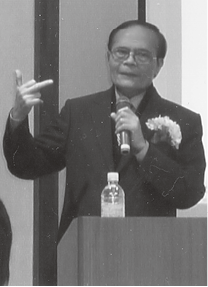
Mr. Ngoc began his speech with such a premise, “Poetry is something beyond the language for Vietnamese. It brings what people hope. Some people call Vietnam ‘the Country of Poetry,’ and I agree with it.” The Vietnamese have long tradition of oral literature, and it still continues. Ca Dao is a poem with “simple, rhythmic, and emotional melody.” Folk music influenced Vietnamese mind. In Vietnam, there are poems written with Chinese letters. There are poems written with Chữ Nôm, which is the vernacular letters developed from Chinese. These pomes are for the people in upper class. In Japan, Man’yōgana, the ancient letters, is simplified into Hiragana and Katakana. In contrary, Vietnamese is tone language so that there are too many syllables to create corresponding letters. 4,000 letters will be necessary to simplify like Hiragana.
He said, “Vietnamese is the mono syllabic language with six different tones. Each tone has six different patterns of sound. That means single word can be six different words. Vietnamese is complex but unique musical language.”
Vietnamese poetry is based on oral literature and ancient Chinese verses. Vietnamese poets who wrote poems by using Chữ Nôm were born of the influence of the Chinese verse. Nguyễn Trãi is a poet, and also one of the heroes in Vietnam. He is compared with Lê Lợi, a founder of the Later Lê dynasty. “Nguyễn Trãi brought victory with strategies and poems. He expressed his feeling in his works, and transmitted his great achievements to the next generation.” Hồ Xuân Hương is a poet who declared the right of the women. Her work was full of reality and satire, and criticized conservatism. Nguyễn Du is one of the most famous poets in Vietnam. It is said that everyone will choose his well-known work The Tale of Kiều as the best poem of all time.
“The Tale of Kiều is composed of more than 3,000 lines. It is an encyclopedia written with Vietnamese, and the beautiful crystal of Vietnamese poem and language.” The work supported the citizens emotionally when they were in hard situations.
In 20th century, Vietnam was in difficult situation with the French in Indochina. The new political party was founded during the August Revolution. Vietnamese poetry developed in the situation. It is called “New Poetry,” which lasted more than ten years. The influence of French poetry and the tradition to Indochina fused into the one poetry.
Quoc-ngu is the Vietnamese alphabet used by French Jesuit. The intellectuals in Vietnam accepted Quoc-ngu as the national language. Many well-known Vietnamese poets expressed the emotion of Vietnamese in alternative expression.
Many poets wrote poems on the two long wars, the battle against France through 1946 to 1954 and the United States through 1954 to 1975. To Huu is one of the most famous poets in this age. He is the representative of anti-war poet. Trịnh Công Sơn, a poet and musician, is called as “Bob Dylan of Vietnam.”
Since April 30th, 1975, the Vietnamese poetry changes from the political one to the one which expresses “the human-being who live their lives.”
Mr. Ngoc spoke “Poetry has always been with people, and loved by the people” from thousands of years ago. He introduced how Tran Dang Khoa, Lê Thánh Tông, Trần Quang Khải, Lý Thường Kiệt, Phan Bội Châu, and Ho Chi Minh influenced Vietnam as poets. Phan Bội Châu sent students to Japan in Đông Du movement. Ho Chi Minh wrote hundreds of emotional poems. He always concluded the new year speech by reading his own poem.
Poems in Vietnam now can be heard or read on radio, TV, newspapers, leaflets, books, and Internet. Also, 15th “Vietnam Poetry Day” is going to be held this year. The festivals will be held all areas of Vietnam.
Eleven poems of Ngoc were read by himself. Japanese translations were read by Michiko Harada, Tomoko Kobayashi, Machiko Yamanaka, and Shigeshi Hara.
Masaya Shiraishi, a professor of Waseda University, and Masataka Ota, Chairman of Japan Poets Club, gave the speech. Masayuki Tamura gave the opening speech, and Ken Niinobe the closing speech. Koya Akiyama served the emcee. Kae Morii and Ikuya Mitsutomi were the support member. Fumie Michigami and Koyumi Washizu served an interpreter.







